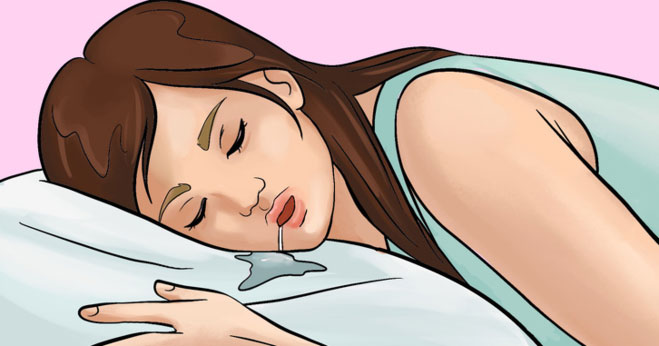How to prevent drooling when sleeping
Clean your sinuses, change your sleeping position, use support equipment or surgery to prevent drooling during sleep.
When sleeping, the facial muscles and swallowing reflexes will stop working. At this point, the saliva accumulated in the mouth will begin to flow freely, according to Bright Side.
Drooling during sleep is normal but if it occurs often and excessively it may be due to a stuffy nose or signs of excessive neuropathy. Also, people who have had health problems like stroke tend to drool more often.

When sleeping, the facial muscles and swallowing reflexes will stop working, then saliva will flow freely.(Artwork: BS).
How to reduce or prevent drooling:
Through nasal sinuses
Nasal congestion causes you to breathe through your mouth and lead to drooling. Cleaning and clearing the sinuses is the best way to avoid drooling as a wet pillow every night:
- A hot bath will clear the nose and help normal breathing at night.
- With essential oils, eucalyptus essential oil will help you breathe easily and sleep better.
- Use products that clean your sinuses.
Also, make sure that you have successfully treated nasal infections to avoid various complications such as permanent congestion.
Change sleeping posture
Lying on your back when you sleep, saliva is secreted without flowing out. Conversely, if you sleep on your side or on your stomach, saliva builds up that may flow out of your mouth and on your knees.
If you find it difficult to hold a position during sleep, place blankets and pillows around to keep your posture comfortable.
High head pillow when sleeping
Head pillow on a high pillow while sleeping can reduce drooling and make sure you feel comfortable.
Use special equipment
Your doctor will advise you to use appropriate dental equipment to close your mouth when sleeping or to regulate drooling, to help you sleep better.
Check the medicine you are using
Some antibiotics can cause side effects that make saliva excessive.
Surgery
With severe illness, the doctor may surgically remove glands or pathologies that cause drooling, often severe neurological diseases.
- The reason people can't sneeze while sleeping
- Why is it good to sleep on one side?
- Guess the puppy's personality through the 6 most popular sleeping postures
- Research: Sleeping naked makes you happier
- New discovery about the effectiveness of sleeping pills
- Not having a good sleep? Try to see if there is 1 in 5 reasons!
- Decode the phenomenon of not sleeping in a strange bed
- Sleeping room for guests in transit at the airport
- Men sleeping after 0h are prone to infertility
- 5 strange phenomena happen while sleeping makes many people panic
- Misuse of sleeping pills increases the risk of death
- Sleep on the weekend - should it?
 13 causes of non-itchy rash
13 causes of non-itchy rash How the mouse with human ears changed the world?
How the mouse with human ears changed the world? The truth about 'fried rice syndrome!
The truth about 'fried rice syndrome! What is dental implant?
What is dental implant?